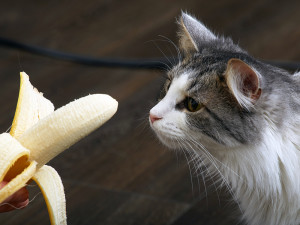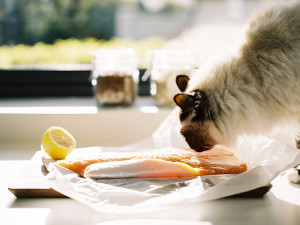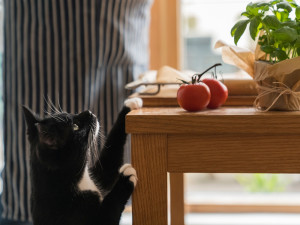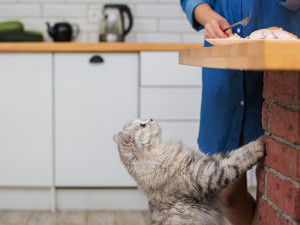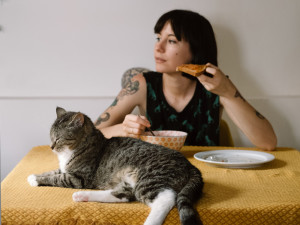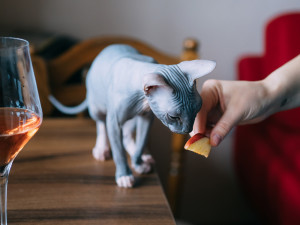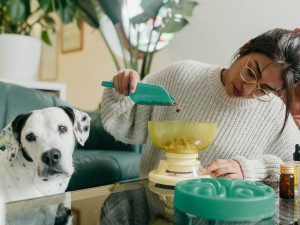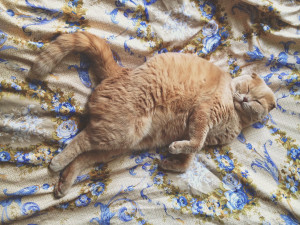Can Cats Eat Corn?
A few kernels won’t hurt, but think twice before doling out a bowl of the stuff.
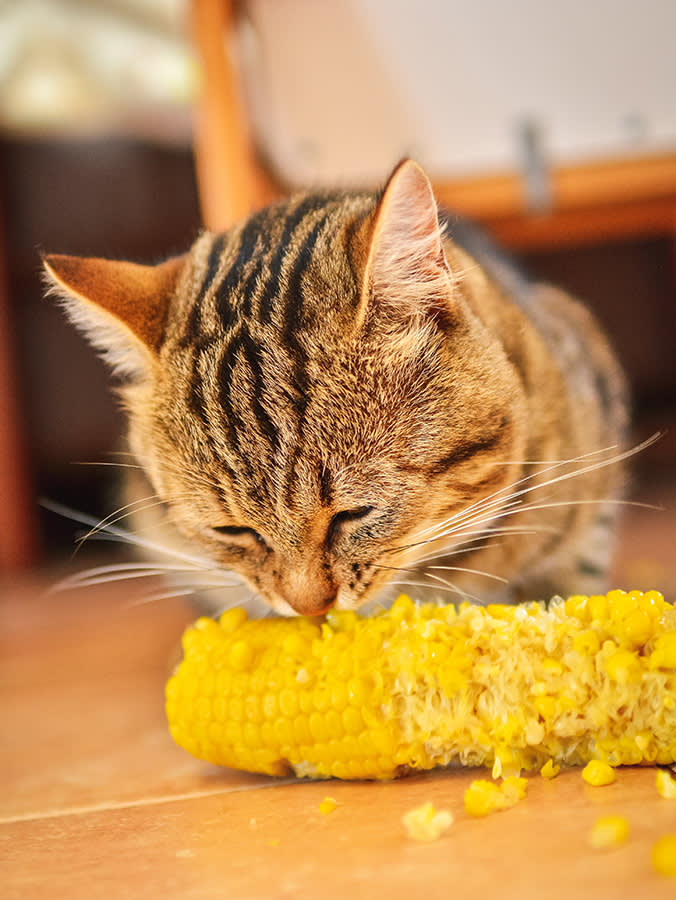
Share Article
Few veggies are more satisfying than fresh corn in the summer, so why wouldn’t you want to share that deliciousness with your cat? Corn kernels are a perfect size for cats to chomp on, and many love the crunch and flavor. There’s nothing to worry about if a little bit of corn gets stolen off your plate or bounces away while you’re cooking. Just keep your kitty from getting into large amounts or into whole cobs of corn.
Corn is not toxic to cats, and you can share a few plain kernels with your kitty as a treat without worry. Corn husks and corn cobs can pose problems for cats though, so keep them out of reach.

littleKin™ is Kinship’s home just for puppy and kitten parents. Bop over to check out expert advice, new pet tools, and special deals—all curated for your newest family member.
opens in a new tabNutrition facts: corn for cats
Many cat foods (especially dry formulas) have corn as one of their primary ingredients. Corn is high in both fiber and carbohydrates. Fiber improves stool consistency (reducing the risk of constipationopens in a new tab), overall bowel health, and glycemic control. Carbohydrates are used as a source of calories, providing easily available energy for the body.
Cats surviving in the wild don’t naturally ingest many carbohydrates, but house cats seem to be able to adaptopens in a new tab to higher-carbohydrate diets without significant problems. There is ongoing researchopens in a new tab about the ways that the ratio of carbohydrates to fats to protein affects a cat’s weight and blood sugar. Currently, the evidence supports feeding a low-carbohydrate diet to cats with diabetesopens in a new tab. Low-carb diets don’t seem necessary for healthy cats as long as they are maintained at an appropriate body weight.
In addition to fiber and carbohydrates, corn also contains a good amount of some vitamins and minerals, such as:
Vitamin C
Vitamin B6
Lutein
Iron
Manganese
Phosphorous
Zinc
Magnesium
Is corn good for cats?
With all this great stuff in it, it may be tempting to add corn to your cat’s diet to reap some benefits. Despite its nutritional value, corn should be only an occasional treat. A nutritionally balanced cat food should be their primary diet because these diets are formulated to provide all the vitamins, minerals, and amino acids cats needs to thrive.
Can cats eat corn cobs?
Cats should not be offered corn cobs to chew on. Although cats are less likely than dogs to swallow large pieces of corn cob whole, a determined cat can certainly gnaw off some chunks. Corn cobs do not break down well in the stomach and often pass into the intestines whole. Due to their rough, uneven surface, corn cob pieces are notorious for getting stuck in the intestines as they try to pass through.
An intestinal blockage is very dangerous for a cat and can make them very sick, very quickly. An intestinal obstruction caused by a corn cob will usually require a major abdominal surgery to resolve. As funny as it is to watch your cat wrestle with a corn cob to get pieces of corn out, it’s not worth the risk.
Can cats eat corn husks?
Corn husks are full of indigestible fiber and often used as a wrap when cooking tamales. Though they help protect and shape the tamales, the husks themselves are inedible and do not break down in the stomach if eaten. Cats may be tempted to eat discarded corn husks used in cooking because they’ve absorbed some of the flavor of the food within.
Be sure to keep corn husks out of the reach of your kitty. Similar to corn cobs, they can cause an intestinal obstruction as the body tries to pass them through the GI tract. Even if they never make it past the stomach, they can cause vomiting and nausea due to their bulkiness.
Is corn completely safe for cats?
Whether fresh, cooked, canned, or frozen, the corn you eat is a safe snack for cats. It should be obvious, but don’t feed corn that you wouldn’t eat to your cat. Corn that is moldy or discolored can contain aflatoxinsopens in a new tab, which are fungal toxins that can cause severe liver injury and other problems. Corn cobs and corn husks should be kept away from cats because they are not digestible and can cause severe gastrointestinal problems like obstruction.
Even though corn isn’t toxic to cats, it should only be offered as a little snack to healthy cats. Cats with diabetesopens in a new tab shouldn’t be given corn due to its high carbohydrate content. Avoid offering corn cooked with a lot of butter or seasoning. Take special caution not to feed corn cooked with onion or garlic (even in powdered form) because those ingredients can cause serious problems for cats.
The bottom line: Can cats eat human food?
Cats love involving themselves in their parents’ meals, and it’s always tempting to share a little bite with them to see what they like. Many human foods are safe for cats to taste, but sticking to a balanced diet made for cats as their primary source of nutrition is vital to your kitty’s health.
Other foods that are safe for cats
Popcorn: Unsurprisingly, the dried and popped version of cornopens in a new tab is also safe for cats. Just keep it plain and avoid salty or buttery flavorings to reduce the risk of stomach upset.
Carrots – Carrots are crunchy opens in a new taband satisfying for cats to bite into. They’re safe for cats to eat, as long as you offer cooked carrots or cut raw carrots into small pieces that don’t pose a choking hazard.
Strawberries – Although many cats have little interest in sugary foods, some seem to have a sweet tooth. Offering your kitty a bite of a strawberry opens in a new tabas a treat shouldn’t cause any issues and may be a surprisingly pleasant snack for them.
Other foods that are dangerous for cats
Grapes: Grapes contain a toxinopens in a new tab that can cause severe injury to a cat’s kidneys. The amount of toxin in each grape is unpredictable, so even a small amount of grape can cause issues. Keep this fruit out of their each.
Garlic – Garlic and onionopens in a new tab come from the same family, and both contain toxins that can destroy a cat’s red blood cells. While most cats won’t be interested in raw onion or garlic, cats can still get sick from foods that contain onion or garlic powder. Keep an eye on the ingredient list of things like soups, broths, and crackers to make sure you’re not inadvertently exposing your cat to this toxin.
Chocolate – Chocolate contains caffeine and other toxins that can cause stomach upset, heart arrhythmias, high blood pressure, and seizures. The darker the chocolate, the more toxin it contains. Be safe and keep all chocolate away from your curious cat.
FAQs (People also ask):
How much corn can a cat eat?
Corn should not be a significant addition to your cat’s diet. Keep calories from corn and other snacks below 10 percent of your cat’s daily calories. Feeding a large amount of corn can cause stomach upset and can imbalance their diet.
Is it OK to give a cat corn?
Corn is non-toxic to cats, and cats can have a little taste of plain corn if they’re interested. It should be reserved for use as an occasional, small snack if it is fed at all.
Can cats eat corn cobs or corn husks?
Cats should not be allowed to eat or chew on corn cobs or corn husks. Neither cobs nor husks break down in the stomach, making them a risk to cause a serious intestinal obstruction in a cat.
References:

Dr. Bartley Harrison, DVM
Dr. Bartley Harrison, DVM is a small animal veterinarian based in North Carolina who has practiced emergency medicine since graduating from the Texas A&M College of Veterinary Medicine. His primary interest areas include pain management, cardiology, and the treatment of shock.
He is a member of the Veterinary Emergency and Critical Care Society, American Veterinary Medical Association, and American Medical Writers Association. In addition to his clinical work, he writes pet health articles to help provide accurate information for both new and experienced pet parents. When he’s not working, he enjoys cooking, traveling, reading, and going on adventures with his dog.
Related articles
![A kitten sniffing a ripe half of an avocado in a bowl]() opens in a new tab
opens in a new tabCan Cats Eat Avocados?
Just don’t get out the guacamole bowl.
![Cat asking for human food from counter]() opens in a new tab
opens in a new tabWhat Can Cats Eat Besides Cat Food?
Good news for your begging cat: Some of your favorite snacks are safe to share.
![A woman eating peanut butter toast with her cat laying on the table]() opens in a new tab
opens in a new tabCan Cats Eat Peanut Butter?
The sweet-and-salty treat is OK in moderation.
![A gray Sphynx cat sniffing an apple slice held out by her owner while standing on a table next to a glass of wine]() opens in a new tab
opens in a new tabCan Cats Eat Apples?
Yes, but the fruit might not hold much a-peel.
![Woman measuring dog food with scale]() opens in a new tab
opens in a new tabShould You Put Your Dog on a Low-Calorie Diet?
Diet culture is a tricky thing — for pets, too.
![overweight orange cat]() opens in a new tab
opens in a new tabHow Much Should You Actually Be Feeding Your Cat?
If they’ve lost their hourglass figure, then not that much — according to a veterinary nutritionist.
